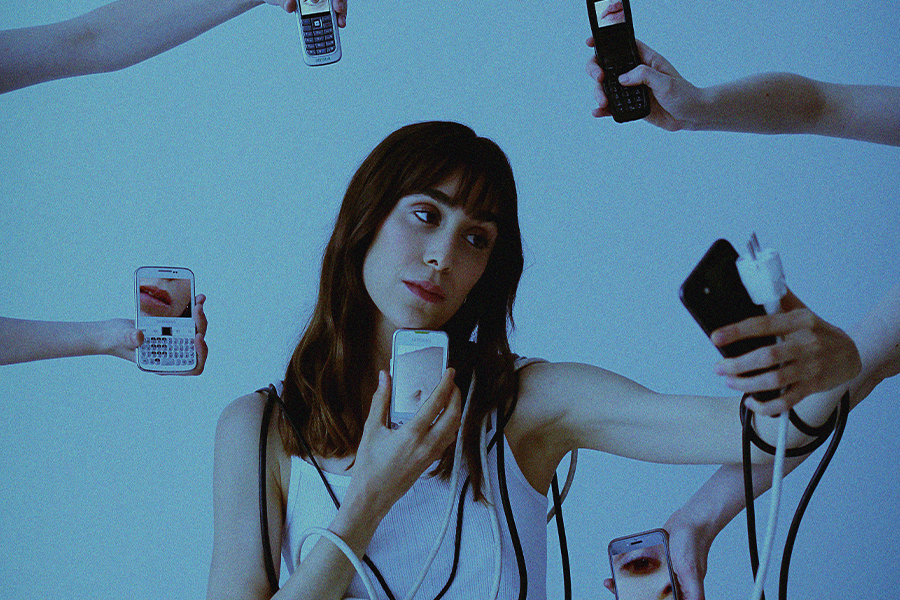Seen 00:25 delves into the pressures that young women face in today’s society, specifically around body image and self-reflection on screens. We caught up with writer and performer Candela May who shares her insights on the process of creating the show.

OMNIBUS THEATRE: Tell us what your show Seen 00:25 is about.
CANDELA: Seen 00:25 is a solo female show exploring the depths of the mind of a young woman, who suffers from anorexia. Miss A, our protagonist, takes us on a journey of self- destruction and self-discovery all at once. She examines the world she lives in without leaving the sanctuary of her room. Taking the name of the girl who was first diagnosed with this disorder, she navigates and explores the twenty-first century, and the societal triggers that have damaged her and other young women’s mental health.
OMNIBUS THEATRE: Can you tell us a little bit about the inspiration behind the show and why you chose to focus on themes such as obsession, mental health, social media addiction, and eating disorders?
CANDELA: This piece was born out of a need to understand something that I was going through. I had an urge to put down into words thoughts and feelings I was dealing with before the pandemic and during lockdown, and so I decided to channel all this through a character and a story. I wanted to take part of my experience and show its rawness by making it extreme and by fictionalizing it. I think I did not choose to focus on it, it was more of an urge to share the pressure that most of young women and I were and are struggling with constantly. And the role that all these triggers play on our collective and individual mental health.
OMNIBUS THEATRE: Can you talk about the character of Miss A and what she represents in the show?
CANDELA: Miss A was the first girl diagnosed with anorexia nervosa in 1866. We don’t know what her real name was since this was the name given to her by her doctor, Sir William Gull, to talk about this disorder. I wanted to give the character this name to honor this young woman. Our character believes that she is Miss A’s reincarnation, and by that she takes on the pressure and the baggage that young women have felt since the beginning of time.
OMNIBUS THEATRE: How does the show delve into the pressures that young women face in today’s society, specifically around body image and self-reflection on screens?
CANDELA: The pressure that we place on ourselves when we compare ourselves in the distorted reality of the internet, a reality where almost no body fits, the normative is unattainable for most of us. Social media has made visible the violence that is exerted on the bodies of women, evidencing that our bodies continue to be viewed from a masculine point of view. From that perspective we are objects, not subjects. Following that pattern, our life revolves around the image that we project on the screen.
OMNIBUS THEATRE: In your research for the show, what did you learn about eating disorders and their impact on young women, and how do you hope to shed light on this issue through the performance?
CANDELA: When doing research for the show we learned many things about the history of this mental illness. It dates back from medieval times, when women started fasting and stopped eating to get closer to God. This self-imposed self-starvation was in the name of religious piety and purity, so in the beginning it had nothing to do with body image in itself. However, body image came into play on the 20th century, especially in the 60s with models like Twiggy and then again in the 90s with all the supermodel zenith. This has been present since then, and it goes beyond one’s physical appearance, because it is also highly related to the mental health of the individual. When devising and performing the piece we have been surprised by the large number of women who have approached us telling us that they too have suffered or are suffering from an eating disorder. The issue here is that it is usually underdiagnosed, meaning that the lack of information and resources, restrictive diets, the fact that it is a disease suffered mainly by women and other factors make this disease go sometimes unnoticed.
OMNIBUS THEATRE: Can you discuss the use of social media in the show and how it ties into the overall themes of obsession and mental health?
CANDELA: Social media and the use of screens plays a crucial part in our show. We felt like we could not talk about mental health and eating disorders within girls and young women today without delving and digging deep into the realms of the internet and the overexposure it entails. Miss A loves her multiple screens and decides to display them all. And she also shows how she sees herself within those screens, through those cameras. We get to see her in different realities, that is in the different devices she is using. Obsessions and mental health disorders are only amplified by social media, since these platforms are constantly manifesting unattainable realities, that is, unattainable and fictitious bodies, lives and relationships.
OMNIBUS THEATRE: How does the show approach the delicate subject matter of mental health, and what measures did you take to ensure that the performance was respectful and sensitive to those who may be struggling with these issues in real life?
CANDELA: It is extremely important for us to be very mindful about the trigger warnings of this show. We are very aware of the delicacy of the subject matters we are tackling, and when talking about them to potential audience members, we are always making them aware of these. People’s wellbeing and them taking care of their mental health it’s the most important thing. We would not recommend our show to someone who is currently going through an eating disorder.
OMNIBUS THEATRE: Can you talk about the creative process of bringing the show to life, what has been its journey to date?
CANDELA: I started writing this piece in 2019, and it came of a need of expressing what was going on inside of me. When we went into lockdown, I decided to sit down and finish it. In 2021 I started an 8 months’ workshop with a Spanish actress and theatre maker called Barbara Mestanza where I started to devise the piece. It was there, in this class, where I met my co-director, Raquel Arnaiz.
OMNIBUS THEATRE: What was most challenging and most rewarding about the experience?
CANDELA: Having the chance to incarnate and give a voice to Miss A has been one of the most rewarding parts of this experience. And seeing how girls, women and even men of all ages connected to this story has been incredibly special. This was my second time producing something of my own, and I always find that very challenging, since it is not my area of expertise. But I guess you have to learn how to do it in order to make it all happen! And since this story was also written by myself, sometimes I felt a bit scared of sharing it with the world, and those self-doubts were a bit challenging to deal with. But I also think this comes with every creative process you immerse yourself in, so I just took those nerves and used them to create something honest and unfiltered.
OMNIBUS THEATRE: What future projects do you have in the works, and what audiences can expect from you?
CANDELA: We are currently touring with Seen 00:25 and we might take it to other places. I’m also working on a script that is on the early stages of development. Raquel is directing two other shows with a feminist perspective in Spain that are about to open in Barcelona and Cantabria.
OMNIBUS THEATRE: What do you hope audiences will take away from the show, and what do you hope they will reflect on after seeing it?
CANDELA: We want to reinforce the idea that we should not look away from what is hard to watch but instead take action. We have felt imprisoned by our own bodies and by what is expected from them for a long time. So, we want this piece to be a healing passport, a way out for all those who feel or might have felt that they don’t own themselves. All our lives we have been told how good girls should behave, but what happens when we take that behavior to the extreme? We aim to portray the truth of the Y and Z Generations using raw emotions and real examples of what it may be like for us, young girls and women, today. We hope that this piece will help our generations navigate and comprehend better mental health coping mechanisms in the 21st century.
OMNIBUS THEATRE: Describe the show in three words.
CANDELA: Existentialist, raw and zillennial.
SEEN 00:25 will be performed at Omnibus Theatre on 17-19 March. Find out more here→



